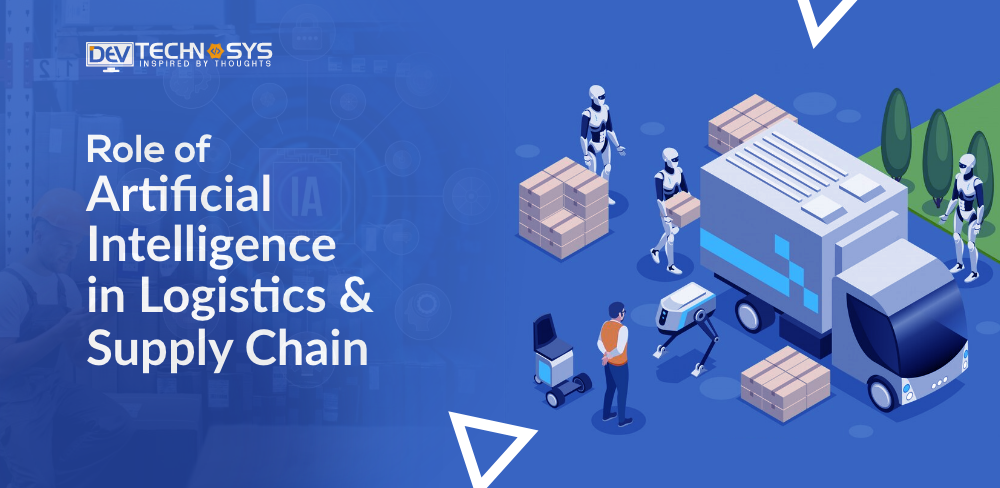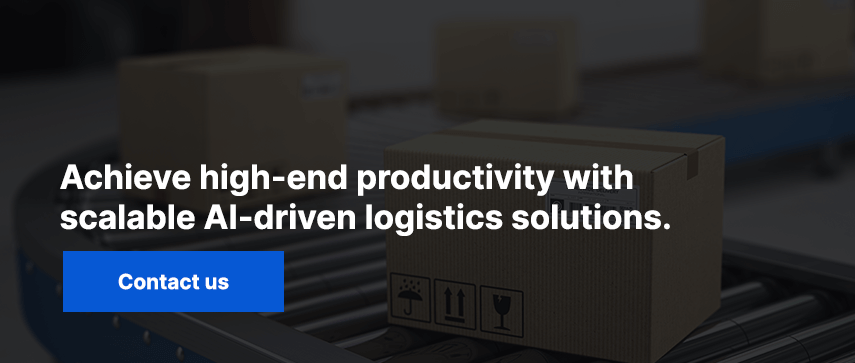Artificial Intelligence In Logistics & Supply Chain revolutionizes how businesses manage their operations. AI in logistics and supply chain refers to using advanced technology to automate and optimize the process. It improves decision-making and enhances efficiency and productivity in the industry.
As per the study, supply chain companies expect that the donut of machine automation in their supply chain operation will double within five years. Additionally, global spending on the IoT platform is estimated to grow from $1.67B in 2018 to $12.44B in 2024, accomplishing a 40% compound annual growth rate in some years. This figure depicts how artificial intelligence has become indispensable for businesses that want to stay competitive and meet the changing demands of the global market.
If you want to learn more about AI in logistics and supply chain, read this blog, delve into the exciting world of AI in logistics and supply chain, and discover how AI is reshaping the future of this industry.
What Is Artificial Intelligence in Logistic and Supply Chain?
Artificial intelligence is an evolving technology that tries to create similar human intelligence using machines. It enables them to perform numerous tasks, from simple to highly complex. It has become an integral part of most industries, and the supply chain and logistics industry is no exception.
AI in logistic and supply chain offers real-time data insights that save money and time, reduce waste, and make the operation more efficient. There are several kinds of AI in supply chain and logistics, a few of them are mentioned below.
1. Natural Language Processing (NLP)
NLP is a branch of AI that enables computers to comprehend, generate, and manipulate human language. NLP improves accuracy and efficiency in various applications in logistics and supply chain.
Natural language processing is revolutionizing data handling through the supply chain. It can translate information about foreign shipments, understand customers’ inquiries in real-time, and provide voice-activated commands for warehouse operations.
2. Machine Learning
In logistics, machine learning uses advanced statistical models that optimize routing decisions, automate order fulfillment. It predicts demand for suppliers and materials, forecasts supply chain disruption, reduces transportation, and identifies customer demand patterns.
3. Robotic
Robotics is revolutionizing the supply chain and logistics industry. Businesses may raise their bottom line by establishing transparency and improving supply chain visibility. Robotics can also change automated inventory management, warehouse operations, forecasting, and customer experience.
Market States of AI in Logistic and Supply Chain
According to the research report on the global “AI in Supply Chain and Logistics Market,” the AI in logistics and supply chain report includes a statistical analysis of prospects, the latest technological advancements, and the demanding scope.
Learn about some more market statistics of AI in logistics and supply chain:
- With the global cargo drone industry expected to reach 17.88 billion dollars by 2023, AI is anticipated to play a critical role in improving supply chain business efficiency for companies that adopt it.
- The global artificial intelligence logistics and supply chain market was estimated at USD 5172.68 million in 2022. Over the forecast period, the market is projected to grow at a CAGR of 19.43%, reaching USD 15010.88 million by 2028.
- The artificial intelligence market in the supply chain and logistic market ecosystem was estimated to be worth USD 1.7 billion in 2018 and is projected to expand at a compound annual growth rate of 24% to reach USD 12 billion by 2027.
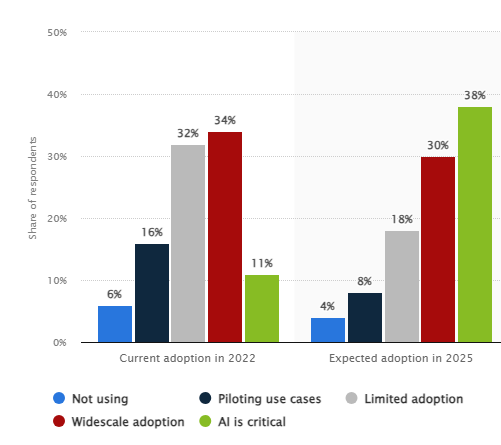
Source: statista
The use of artificial intelligence in the industrial and supply chain industries is estimated to rise between 2022 and 2025. Additionally, one-third of executives anticipated that AI would be widely used in their businesses by 2022.
5 Key Benefits of AI in Logistic and Supply Chain Management
From the above statistic, you have learned what makes businesses implement AI in their supply chain and logistics. Now, understand why applying AI in logistics and supply chain is beneficial. A few benefits give a reason to use AI in the industry.
1. Improved Delivery Accuracy and Speed
2. Optimal Resource Allocation
3. Streamlined Process
4. Seamless Customer Service
5. Real-Time Monitoring
Let’s discuss these point in detail.
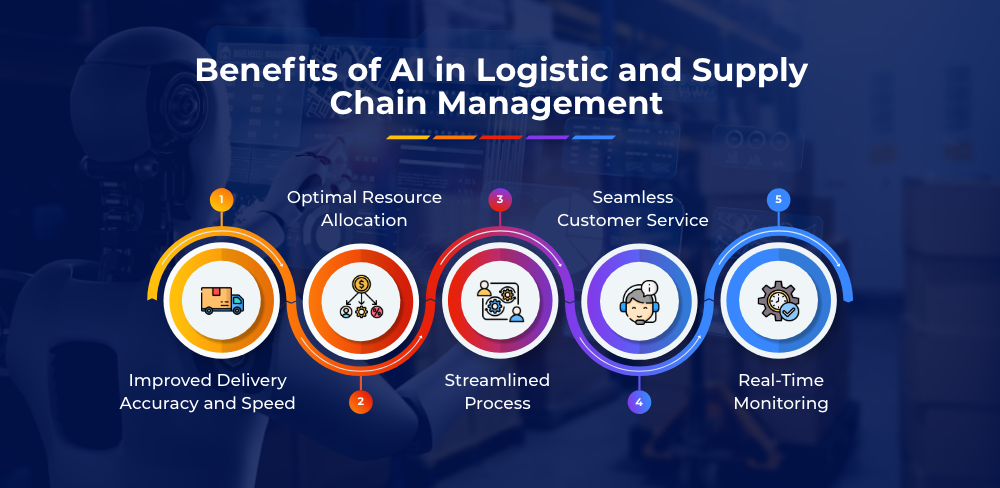
Take a look at the following points:
-
Improved Delivery Accuracy and Speed
Improved delivery accuracy and speed are critical benefits of AI in logistics and supply chain. With AI-powered optimization, logistics organizations can easily analyze data on delivery points and other components to optimize routes and schedules.
It not only reduces error but also improves efficiency and speed. Companies in the industry can take the help of a travel app development company to integrate AI solutions. It enhances these capabilities, seamlessly integrating AI-powered features into logistics operators.
-
Optimal Resource Allocation
Artificial intelligence software can analyze vast data to find the best distribution centers, trusted suppliers, and the most effective routes. Analyzing AI in warehouse management optimizes resource allocation by analyzing data on inventory levels, storage capacities, and demand fluctuations. It ensures an optimal use of warehouse space and minimizes waste.
-
Streamlined Process
Businesses manage supply chains through artificial intelligence by simulating and recommending optimal routes. However, IoT app development services facilitate the integration of AI-generated applications into existing systems. This streamline the processes such as order processing, communication with stakeholders, and collaboration, improving overall productivity.
-
Seamless Customer Service
AI provides real-time order tracking and personalized communication, enhancing customer services in the logistics industry. Virtual assistance and chatbots are critical examples, offering 24/7 support and updates. In this, predictive analytics assist to anticipate customer needs and also optimize inventory to ensure a positive customer experience.
-
Real-Time Monitoring
AI in logistics and supply chain ensures prompt visibility into the movement of goods and vehicles. Companies in the industry can continuously track and instantly update shipment status. This enables proactive decision-making and efficient problem resolution for optimized supply chain operations.
However, monitoring systems should be implemented to assess model performance continuously. You can regularly update models by taking assistance from mobile application maintenance and support services providers to ensure they remain accurate and relevant.
Real-World Use Case of AI in Supply Chain Management
In the logistics industry, companies are increasingly embarrassing AI-powered logistic services. It advances the organizational supply chain management and avoids unnecessary costs. Here are few use cases of AI in supply chain management.
1. AI in Inventory Management
2. AI in Demand Forecasting
3. AI in Risk Management
Let’s discuss these points below in detail.
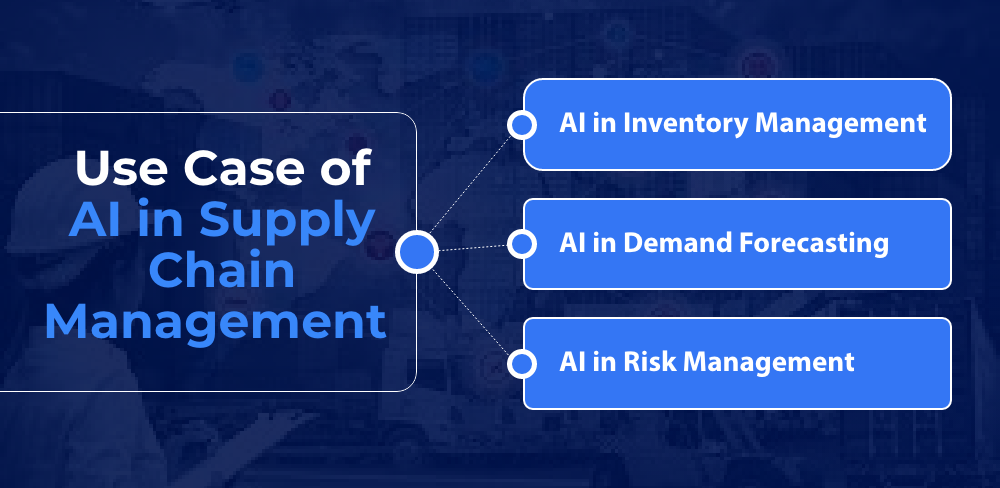
-
AI in Inventory Management
Nowadays, most industries use AI in their business to optimize inventory levels and smooth operation processing. For instance, Amazon (retail giant) embraces AI to predict product demand based on customer behavior, market trends, and historical data.
It enables the company to optimize its inventory level and always ensures the product’s availability. This enhances customer experience and improves the organization’s operational efficiency.
Various supply chain management software helps companies operate efficiently and increase profit. But Perpetual is the best inventory management software. It enables companies to deal with the complicated medium-large amount of stocked items.
-
AI in Demand Forecasting
Companies use artificial intelligence to forecast demand for their product and services. This information optimizes production schedules, inventory levels, and pricing.
For instance, through AI techniques like machine learning, computer vision, and natural language processing, Walmart forecasts demand for its products. With the upcoming boost in demand, UPS facilitates proactive adjustments in its supply chain.
-
AI in Risk Management
Companies in the industry leverage artificial intelligence for risk management by analyzing a large amount of data. Companies like DHL use AI to identify potential risks, such as transportation delays and supply chain disruption. Additionally, AI algorithms predict and mitigate risk in real time, ensuring smooth operations during uncertainties.
Challenges in Implementing AI Technology in Supply Chain and Logistic
Challenges in implementing artificial technology in the transport industry revolve around data quality and integrity, workforce concerns, data privacy and security, high initial costs, and scalability issues. As per the supply chain app development company, following are some of the challenges that logistic businesses might face.
1. Quality and Integration
2. Workforce Concerns
3. Data Privacy and Security
4. Scalability Issues
5. High Initial Costs
Let’s now check out the above points in detail.
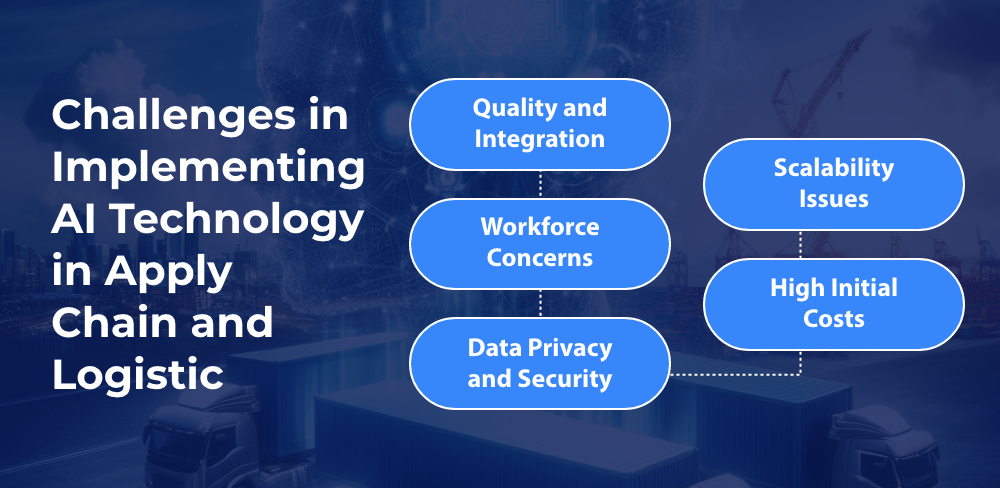
-
Quality and Integration
AI-powered systems rely on consistent, accurate, up-to-date data to make predictions and generate insights. However, ensuring data quality and integrity across the supply chain is difficult, especially when dealing with multiple suppliers and data formats. It allows the company to find a reliable generative AI development company to unlock the full potential of AI in optimizing logistic and supply chain operations.
-
Workforce Concerns
Artificial intelligence is taking over particular tasks, raising concerns about job displacement. AI tools can perform tasks more effectively, efficiently, and sometimes at a lower cost than humans. It impacts many niches, from manufacturing to customer services. Addressing these challenges necessitates proactive measures, including reskilling programs and creating new roles complementing AI technologies.
-
Data Privacy and Security
Due to the increasing use of artificial intelligence and data analytics, supply chains accumulate a large amount of sensitive data, raising concerns about potential cybersecurity risks and data privacy in AI supply chain systems.
Companies need to ensure compliance with data protection regulations. By finding an experienced AI software development company, intelligence solutions can be tailored to meet data privacy requirements.
-
Scalability Issues
As businesses grow, AI solutions may struggle to adapt and scale accordingly, leading to AI-driven chain disruptions. Ensure scalability by carefully designing AI systems with flexibility in mind and leveraging cloud-based solutions for data storage; additionally, companies can meet evolving business needs by continuously monitoring and optimizing performance.
-
High Initial Costs
It’s costly to develop and integrate AI solutions into the supply chain. This is because it requires a massive investment in infrastructure, ongoing maintenance, and training to realize AI’s benefits fully.
An-average cost to build an artificial intelligence project or solution ranges from $8000 to $25000. Hence, this upfront cost can significantly hinder AI adoption for small or medium-sized enterprises.
Future of Artificial Intelligence In Logistics & Supply Chain Industry
The future of AI development holds immense promise in the logistics and supply chain industry. AI and supply chain technologies are poised to transform operations, enhancing efficiency, responsiveness, and accuracy. These advancements are leading to enhanced customer service capabilities and improved visibility.
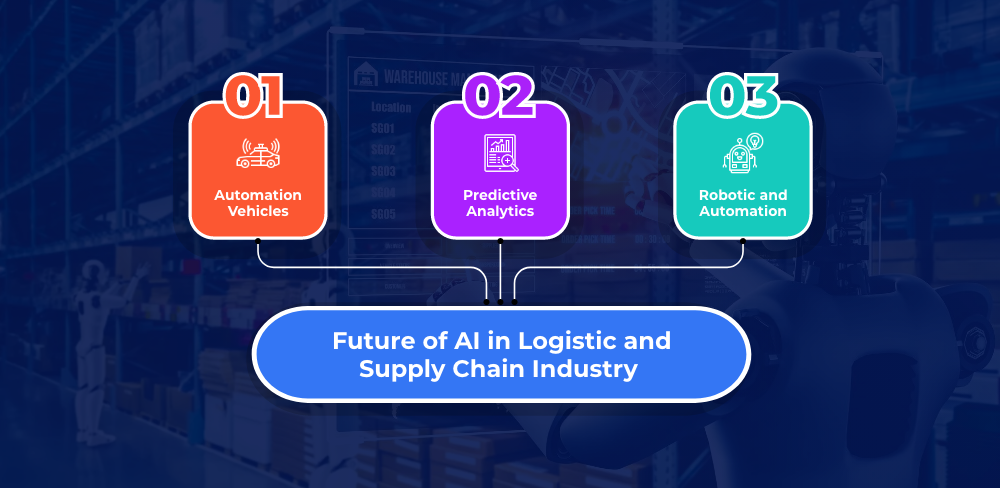
-
Automation Vehicles
The number of autonomous vehicles in the supply chain and logistics industry is expected to increase. This will lead to the safe and efficient transportation of goods. In the future, logistic app development companies will play a critical role in leveraging AI technologies to integrate autonomous vehicles for transportation and delivery, which will reduce cost, enhance safety, and improve efficiency.
-
Predictive Analytics
Predictive analytics play a crucial role in the future of logistics and supply chains. In the future, AI-generated tools or techniques can analyze vast data to estimate demand patterns, optimize routes, and android disruption before they occur.
By leveraging historical data, advanced algorithms, and real-time information, businesses can make more informed decisions and improve overall efficiency in their operations.
-
Robotic and Automation
In the future, AI-powered robots will help automate tasks, including picking, packing, and shipping. This will reduce the cost of order fulfillment and also improve efficiency. AI development companies will continue to innovate in robotic and automation technologies, enabling businesses to deploy intelligent robots for warehouse operations, order fulfillment, and other repetitive tasks.
Top AI Trends in The Logistic and Supply Chain
Artificial intelligence is a powerful technology used by businesses for various purposes. In the logistics and supply chain industry, AI helps companies manage inventories, distribute goods to warehouses, and control real-time transportation routes. Have a look at the top AI trends in the industry.
1. Dynamic Pricing Models
2. Natural Language Processing For Supply Chain Insights
3. Predictive Maintenance
Now let’s check out these AI trends in detail.
-
Dynamic Pricing Models
As supply chains have become complex, logistics companies are optimizing their operations. Here, AI-based dynamic pricing software can be considered as a significant end. It assists businesses in being more strategic in pricing by considering elements such as supply and demand, customer psychology, and competitors.
This trend enables companies to monitor these components and adjust their prices accordingly. Hence, businesses can respond quickly to their market and increase profit.
-
Natural Language Processing For Supply Chain Insights
It’s an emerging trend that companies increasingly use to extract insights from unstructured data sources in the supply chain. By taking help from any supply chain management software development company, businesses can analyze text data from social media, emails, and customer reviews.
Additionally, extracting valuable insight allows businesses to make informed decisions, identify new trends, and improve the overall supply chain performance.
-
Predictive Maintenance
Some companies need help making their employees responsible for faulty machines and paying heavy fines when safety or deadline regulations are not respected. In this case, artificial intelligence helps companies understand what is happening inside any device.
It’s possible by using the data collected from various sensors without being directly connected. AI algorithms are trained with such information and alert if anything is wrong before any significant damage.
Are You Ready to Join Dev Technosys to Avail AI Services?
Artificial intelligence is changing the logistic landscape by providing companies new ways to increase efficiency. AI in the manufacturing industry brings a significant opportunity for enterprises to improve customer experience and efficiency.
AI-generated solutions assist in automating and optimizing route planning, demand forecasting, inventory management, and real-time tracking. It turns to cost saving, improvised resource utilization, fast delivery, and better customer satisfaction.
As AI technologies advance at an ever-changing rate, you need to stay competitive in the market. If you want to create an AI app for your logistics and supply chain management, let Dev Technosys solve the issues of your logistics operation.
We have experienced developers who offer powered solutions for cross-border transportation. We at Dev Technology help our clients save their money and time while ensuring a smooth delivery process.
Frequently Asked Question
1. What Are Some Examples of Artificial Intelligence In The Supply Chain?
Following are a few supply chain data analyst examples, helping you to drive optimization and improve efficiency:
- Warehouse automation
- Demand forecasting
- Supply chain risk management
- Routine optimization
- Real-time supply chain visibility
2. How Much Does It Cost To Create Supply Chain Management Software?
There is not an exact idea about the cost to develop supply chain management software. On average, the cost of supply chain management software may fall between $8000 – $25000. The cost can be altered based on the app’s complexities.
3. How Can AI Improve Inventory Management?
In businesses, artificial intelligence offers accurate demand forecasting, ensures optimal stock level, timely replenishment, and reduces wastages. Hence, it helps to improve inventory management
4. What Role Does Artificial Intelligence Play In Supply Chain Risk Management?
AI plays a crucial role in supply chain risk management, utilizing advanced analytics in order to inquire the external elements and monitor global events. It provides valuable insights and enables companies to identify potential risks before they occur.
5. How Much Does It Take To Hire AI Developers?
Cost of hiring a developer depends on the developer’s locations, their skill, and experience. On average, the cost to hire an AI developer ranges from $15- $25 per hour.
